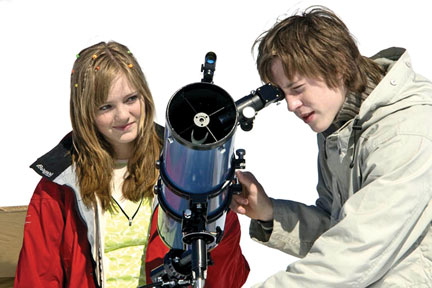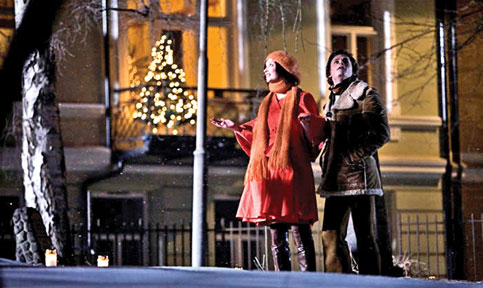|
European Film Festival Reviews:
Appelsinpiken (The Orange Girl) 2009
By Madelene WIGHTMAN
 The
2009 film Appelsinpiken by Eva Dahr is based on a book by
internationally acclaimed author Jostein Gaader. The book is translated
into 43 languages. Appelsinpinken is essentially about two love stories
which run parallel through the story. While it is a nice and rather
moving story in its own right, a great thing about the film is that a
large part of it is shot in beautiful mountain scenery. The wonderful
thing about cinema is that it can transport us to faraway places and if
well filmed, can make the viewer feel that he or she is there. The
2009 film Appelsinpiken by Eva Dahr is based on a book by
internationally acclaimed author Jostein Gaader. The book is translated
into 43 languages. Appelsinpinken is essentially about two love stories
which run parallel through the story. While it is a nice and rather
moving story in its own right, a great thing about the film is that a
large part of it is shot in beautiful mountain scenery. The wonderful
thing about cinema is that it can transport us to faraway places and if
well filmed, can make the viewer feel that he or she is there.
The film begins with a scene of a young boy and girl playing together
in a garden. The children climb trees, chase one another and laugh
together. The scene then cuts to the present day, where a young man, (Georg)'s,
mother presents him with some gifts and an unexpected bundle of letters.
This correspondence is from Georg's father who he believes disappeared
and left them shortly after he was born. Georg has a mental block about
his father, and explodes in anger, believing that he simply left the
family. Yet as the film progresses, he starts to recall elements of
their lives together.
The principal love story is that of Georg's father, Jan Olav who has
been dead for almost sixteen years. The story is told in a series of
letters from Jan to his son, which have been kept until Georg comes of
age (on his sixteenth birthday). Shortly after his birthday, marking
this "coming of age", young Georg (Mikkel Bratt Silset) heads off from
Oslo to the Norwegian mountains to ski and watch the stars. He takes his
father's bundle of letters with him to read on the train, along with
Jan's telescope in the hope of viewing a commet. Georg isn't so sure he
cares about what this stranger has to say, but when he meets a pretty
girl called Stella (Emilie Beck) on the train, his father's story of a
mysterious young man that he first saw in 1982, a new meaning. Georg
begins to avidly read is father's short story.
 Jan
Olav is struck as though by lightning the first time he sees the Orange
Girl (Annie Nygaard), and is sure he has found the love of his life. Jan
(Harald Thompson Rosenstrom) is riding on a bus one day when he sees a
young woman get on board, carrying a bag of oranges. Jan is immediately
smitten with her beauty and her smile, and he tries to help her when he
drops the bag and the oranges scatter across the floor. When the woman
steps off, Jan tries to follow her, but he can't find her, and for the
next few weeks he spends his time looking for the woman. Jan
Olav is struck as though by lightning the first time he sees the Orange
Girl (Annie Nygaard), and is sure he has found the love of his life. Jan
(Harald Thompson Rosenstrom) is riding on a bus one day when he sees a
young woman get on board, carrying a bag of oranges. Jan is immediately
smitten with her beauty and her smile, and he tries to help her when he
drops the bag and the oranges scatter across the floor. When the woman
steps off, Jan tries to follow her, but he can't find her, and for the
next few weeks he spends his time looking for the woman.
His infatuation is like nothing else: the sky turns around and the
earth disappears beneath his feet. Nothing else matters. Jan finally
meets 'The Orange Girl' again and she asks him to wait six months for
her. This is on Christmas Eve and Jan agrees. Six months later, he
receives a postcard from Spain, asking if he can wait a little longer.
Yet Jan is too impulsive to do this and jumps on a plane to Spain. He
eventually finds the Orange Girl at an art academy there and as they
talk he discovers that she is, in fact, the little playmate he had as a
child.
Georg learns a valuable lesson from the father he never knew (and who
he has often resented for 'leaving him' as a young child). He eventually
to appreciate this mysterious man as an individual with his own hopes,
dreams and challenges. The truth about Jan dawns on Georg under a magic
Easter sky in the Norwegian mountains, but he has difficulties
understanding his own feelings and grasping what is happening to him.
There are 20 years between his father's love story and the potential
situation that may unfold between him and Stella. The letter helps him
realise that he cannot let love slip through his fingers, especially as
it turns out that the Orange Girl Georg's mother. Initially whilst away
on the ski trip, although he is friendly with Stella, Georg finds
himself pulling back from commitment. Although they see the comet that
his mother and father saw the night that they got together, through the
same telescope, this night does not end romantically. In fact, Georg
pulls back from Stella and leaves in a hurry (in spite of the fact that
he has shared his parents' with her). It is not until Stella gets back
to Oslo that Georg has come to a realisation about what he is missing
out on. Upon her return, he greets her at the station with a bunch of
flowers.
Jan's and Georg's stories are woven together through the letter. Both
stories tell tales of chance encounters that change their lives. Jan's
letters turn out to be a general source of healing for Geog himself and
for his relationship with his mother. The letters unblock the past and
Georg is able to remember Jan caring for him as a small boy. Slowly the
fact of Jan's diagnosis and terminal illness come back to him and
eventually he visits Jan's grave to finally make peace with the past.
 'Appelsinpiken'
was an unexpected 'tear-jerker'. Initially it seemed that the film was
simply going to be about a rebellious teenage boy. Yet this soon
changed. Both the story of Jan and 'The Orange Girl', and of Georg's
journey of self-discovery in the beautiful, bright mountains became
gripping. 'Appelsinpiken'
was an unexpected 'tear-jerker'. Initially it seemed that the film was
simply going to be about a rebellious teenage boy. Yet this soon
changed. Both the story of Jan and 'The Orange Girl', and of Georg's
journey of self-discovery in the beautiful, bright mountains became
gripping.
The intrigue later turned into poignancy as it became apparent that
Jan's young life with his wife and son was to be cut short.
The fact that his wife was also his childhood playmate was very
moving, given that she would now bring their child up alone. Also that
Georg had been, in many ways, damaged by the absence of his father to
the point at which he had blocked out memories of him. And that these
memories of him resurfaced on the reading of the letters and on the
understanding that he was the son born to Jan and his childhood friend.
All the more powerful was the fact that Georg realised his mother was
the mysterious, independent young woman that his father had been so
besotted with.
The story is really an object lesson about how the people we most
take for granted also have hopes, dreams and disappointments. It is very
easy to cast someone mentally into a role, only to realise later that
others may view the same person and their circumstances very
differently. 'Appelsinpiken' was an easy film to watch, with a straight
forward plot, whilst still absorbing the viewer.
It also provides the foreign viewer with an insight into the
language, culture, landscapes and cities of Norway, a country sometimes
described as 'Europe's best kept secret'. |

